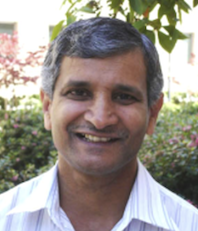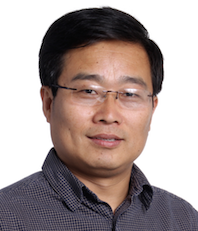-

Project Scientist, Department of Pediatrics
"Immune boosting roles of human milk oligosaccharides on host phagocytic cell antimicrobial function against neonatal pathogens"About the Project
Invasive and/or antibiotic-resistant neonatal infections is a major clinical challenge and devising truly novel therapeutic strategies is urgently needed. Inspired by the intriguing antimicrobial properties of human milk oligosaccharides (HMOs), the proposed transdisciplinary research put the spotlight on HMOs-phagocyte interactions. The project will systematically decipher biomarkers linked to immune-boosting functionalities of HMOs during Group B Streptococcus (GBS) neonatal infection.
About the Awardee
Dr. Askarian is a Project Scientist in Dr. Victor Nizet’s lab in the Department of Pediatrics at UC San Diego. Her career highlights lie within the field of host–pathogen interactions. She combines microbe- and host-based lines of research, which vary from studying individual proteins to complex networks, to explore the molecular pathogenesis of multi-drug resistant (MDR) bacterial infections.
-

Assistant Professor, Department of Medicine
"Investigating the Role of Human Milk Oligosaccharides on Triglyceride and Lipoprotein Metabolism"About the Project
Cardiovascular diseases are the leading cause of death globally, thus considerable interest exists in understanding its cause and developing new therapies. The aim of this project is to establish that human milk carbohydrates can protect infants from developing cardiovascular complications by accelerating clearance of blood lipid levels. Secondarily, we might be able to demonstrate their therapeutic potential as lipid-lowering agents to prevent life-threatening cardiovascular disease in adults. Knowledge gained from the proposed project will guide the development human milk oligosaccharides, a natural component in human milk that is considered safe for human consumption, as new safe and natural anti-inflammatory and lipid-lowering therapeutics that can be used to reduce residual risk in cardiovascular disease and potentially also of other chronic inflammatory disorders.
About the Awardee
Dr. Gordts is an Assistant Professor in the Department of Medicine at the Division of Endocrinology and Metabolism. His research and training are multidisciplinary, spanning biochemistry, genetics, glycobiology, and cell biology, in the context of metabolic disease. Using reverse genetics approaches, he explores the in vivo impact of proteoglycans and human milk oligosaccharides on iron metabolism, hyperlipidemia, atherosclerosis, diabetes, and obesity. The goal is to source the natural mammalian glycan repertoire for therapeutic, diagnostic, and prognostic purposes to help reduce the burden of cardiovascular disease and its detrimental consequences.
-

Ratnesh Lal, Ph.D.
Professor of Bioengineering, Mechanical Engineering, Materials Science and Engineering
"Biophysical Aspects of Milk Fat Globule Membrane – Microorganism Interactions and Relevance to Infectious Diseases"About the Project
Milk and components of milk, particularly milk fat globule membrane (MFGM) possess unique qualities which modulate the interaction of milk components with microorganisms. Lipid associated changes in MFGM composition and their subsequent effects on biophysical aspects of these interactions are poorly understood. We hope to establish a systematic framework of understanding the role of MFGM lipids in these interactions using correlative microscopy and mechanics studies (Atomic Force Microscopy, Fluorescence Microscopy). New understanding from our work will enable designing appropriate interventions in the form of supplements that can fine tune the membrane biophysical behavior to favor synergistic interactions while inhibiting pathological interactions.
About the Awardee
Dr. Lal is a professor of Bioengineering, Mechanical Engineering and Materials Science & Engineering at UC San Diego. Professor Lal is an authority on biomedical applications of atomic force microscopy (AFM), nanoscale 3D dynamic structure-activity understanding of complex biological systems, and sensors and devices. Research in his lab involves the development of nanotechnologies for multi-scale biophysical and system biology studies of channels and receptors. His lab also designs nanosensor and device platform technologies for biomedical diagnostics and therapeutics for global health and security.
-

Professor, Department of Pediatrics
"Adiponectin & Milk Production"About the Project
The mammary gland is embedded in fat, which is essential in mammary gland development and milk production. Adiponectin is an adipocyte-secreted hormone that regulates energy metabolism and multiple biological processes. Our preliminary data and a published paper indicate that adiponectin might regulate mammary gland development and milk production. This project will use mouse models to further study how adiponectin regulates mammary gland development during pregnancy and lactation. The effect of adiponectin on milk's bioactive composition will also be investigated.
About the Awardee
Dr. Shao was trained in medicine and biomedical research. He is an established investigator in obesity and gestational diabetes. His research team has demonstrated the essential role of adiponectin in maternal metabolic adaptation.
2023 MOMI Seeds
This marks the 5th round of our MOMI Seeds pilot grant program after placing the program on hold for one year in 2022 to invest in additional MOMI CORE infrastructure and equipment.
MOMI Seeds Pilot Grants - three Research Priority Areas
- Infectious Diseases & Immunity: effects of breastfeeding or intake of human milk components on infectious diseases and immunity or vice versa
- Metabolism & Metabolic Diseases: effects of breastfeeding or intake of human milk components on metabolism and metabolic diseases or vice versa
- "Milk Moonshot": an innovative and creative idea for a project related to human milk and breastfeeding that does not fit in any of the other Research Priority Areas
12
Applications submitted
$200,000
Research Funds Awarded
4
Awards granted
